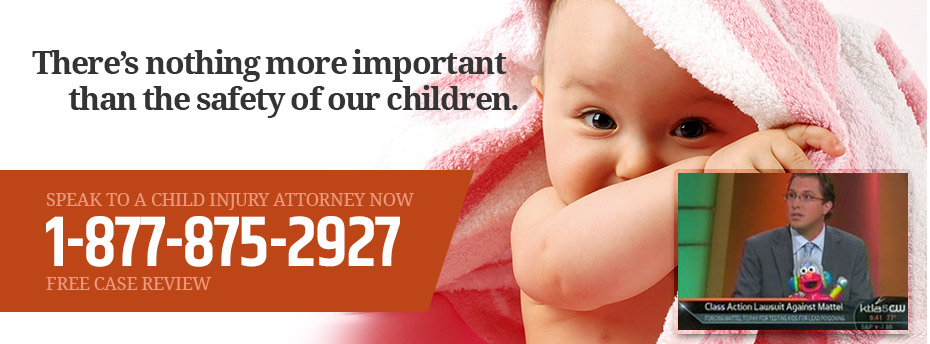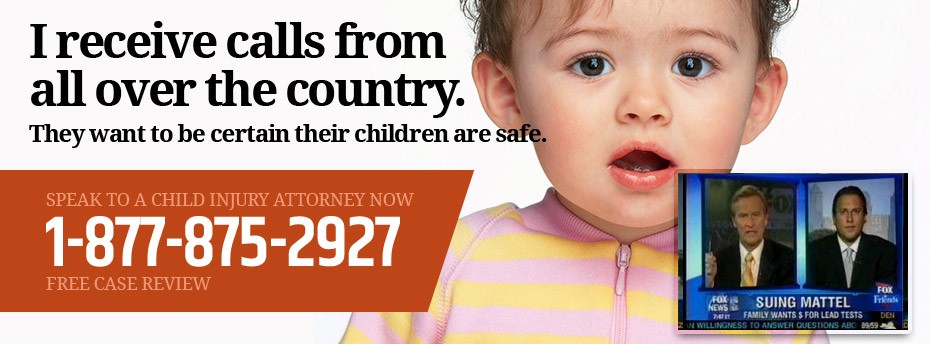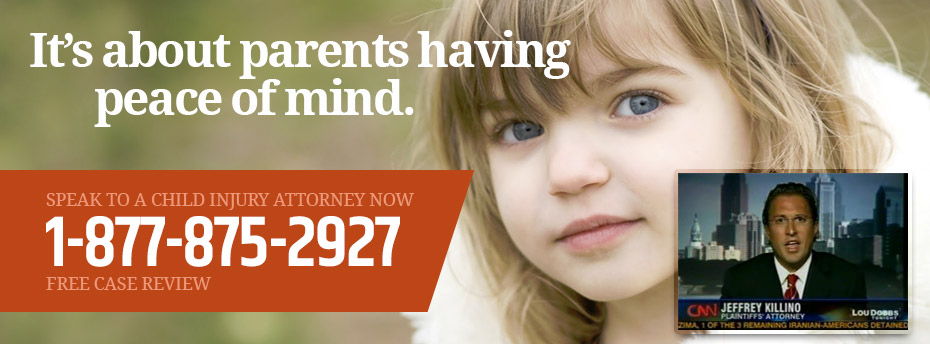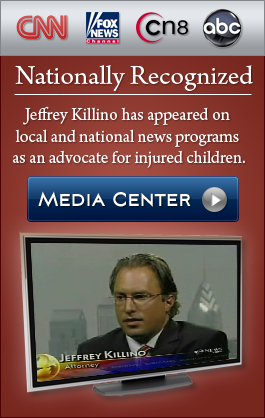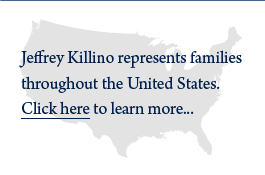If you’re struggling to get your baby to sleep through the night, you may be tempted to give infant sleeper sacks, swaddling blankets, weighted blankets, and similar products a try.
But while infant sleeper bags and swaddling can help soothe a fussy baby to sleep, using a defective product places your child at risk for suffocation, entrapment, strangulation, and sudden infant death syndrome (SIDS). Weighted blankets, on the other hand, are inherently dangerous and should never be placed anywhere near a sleeping baby, no matter the circumstances.
An experienced Child Injury Lawyer, Jeffrey Killino has successfully represented infants and children injured by dangerous products and toys, earning national recognition for his aggressive pursuit of justice for the victims of negligent injuries and wrongful death. If your son or daughter fell victim to SIDS or any injury that could be related to the use of an infant sleeper sack, weighted blanket, or swaddling product, please contact our child injury law firm toll-free at 877-875-2927 to speak with a top personal injury attorney and learn more about your legal rights.
Infant Sleep Sacks and Weighted Blankets: What’s the Problem?
According to the Centers for Disease Control and Prevention, approximately 3,400 sudden unexpected infant deaths involving babies under a year old are reported in the United States every year. In 2019, 1,250 such deaths were attributed to SIDS, and 960 were attributed to accidental suffocation or strangulation. The remaining 1,180 fatalities were the result of unknown causes.
Infant sleeper sacks (also sometimes called sleeper bags or wearable blankets) resemble long sleeveless dresses, but are fully closed at the bottom to completely cover babies’ feet. Manufacturers claim this design keeps infants warm while they sleep or nap while eliminating the possibility that fabric could restrict their breathing – a leading risk factor for SIDS. But overheating has also been linked to SIDS, and sleep sacks and wearable blankets currently are often made of fleece or polyester materials that could cause a baby to become too hot as they sleep.
There have also been reports of children choking when a zipper broke or a decorative embellishment came loose and entered a baby’s mouth. In some cases, these incidents have resulted in product recalls.
While one small study has suggested that weighted blankets might be beneficial for newborns suffering from neonatal abstinence syndrome (NAS), it’s essential to understand the infants involved in that research were continuously monitored in a NICU. Parents and caregivers should NEVER assume that a weighted blanket, weighted sleep sac, or weighted sleep swaddle is safe for use at home, as these heavy products can inhibit a baby’s ability to breathe. There’s also a possibility that an infant will turn onto their stomach while under a weighted blanket. The baby could suffocate if the heaviness of the blanket prevents them from returning to their back on their own.
What About Swaddling Blankets?
Swaddling – the traditional practice of wrapping an infant in a light, breathable security blanket, so they’ll feel snug and secure – has been around far longer than weighted blankets and infant sleeper sacks. In fact, most parents learn this technique and are given at least one swaddling blanket before taking their newborn home from the hospital.
While the American Academy of Pediatrics (AAP) says that swaddling, when done correctly, can help calm a fussy infant and promote sleep, it’s not without risk. For example, swaddling may decrease a baby’s arousal, making it harder for the child to wake up, another possible risk factor for SIDS.
Placing an infant to sleep on their back is especially important when they’re swaddled. A swaddled baby should also be closely monitored, just in case they roll onto their stomach or the blanket comes loose and covers their face. An infant should no longer be swaddled once they actively begin trying to roll over, which usually starts at around two months of age.
Finally, studies have found that straightening and tightly wrapping a swaddled baby’s legs can lead to hip dislocation or hip dysplasia. According to the Pediatric Orthopaedic Society of North America, “healthy hip swaddling” allows the baby’s legs to bend up and out.
What to Know About Recalled Sleep Sacks, Wearable Sleep Bags, and Swaddling Blankets
In recent years, various manufacturers have recalled defective infant sleep sacks, baby sleeping bags, wearable blankets, and swaddling blankets that could cause a child to suffocate, choke on loose or broken embellishment, or result in other harm.
TJX Infant Sleep Bag Recall
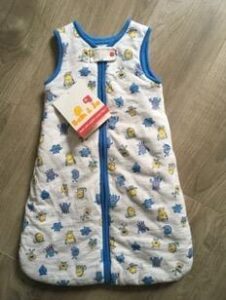
In May 2021, TJX recalled more than 38,000 Infant Sleep Bags in the United States and Canada because the neck opening was too large for babies ages 0 to 6 months. This could allow an infant’s head to slip into and be covered by the sleep bag, posing a risk of suffocation.
The recall involves infant sleep bags, in size 0-6 months, that were sold under the brand names Dylan & Abby, First Wish, First Wish Organic, Harry & Me, Little Red Caboose, Piper & Posie, Sam & Jo, Sam & Jo Organic, Shabby Chic, and Willow Blossom. The brand name and size are printed on two separate labels at the back of the neck, and the style number is printed on a separate label located on the inside side seam behind the care label. The recalled sleep bags zipped up the middle or to the side of the front and came in a variety of colors and designs, including animals, dinosaur bones, splatter paint, circus designs, construction, cars, florals, clouds, robots, stars, dino dudes, monsters, and firetrucks.
The products were sold at T.J. Maxx and Marshalls stores nationwide and online at tjmaxx.com, marshalls.com, and sierra.com between April 2018 and February 2021 for about $20. Consumers should immediately stop using the recalled infant sleep bags and contact TJX for instructions on how to participate in the recall and receive their choice of either a full refund or a store gift card.
Loviebee Security Blankets
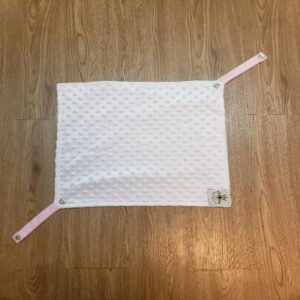
On July 9, 2019, Swaddle Bee recalled around 700 Loviebee infant’s security blankets because snaps could detach and cause a choking hazard. At the time of recall, Swaddle Bee had received two reports of the blanket’s metal snaps detaching, but no injuries were reported in connection with these incidents.
The Loviebee security blankets were available in blue/gray, blue/white, pink/gray, and pink/white color combinations with optional personalized embroidery. They have a polyester mink-like fabric on one side and velour on the other side and measure about 16 inches by 16 inches. They have two straps with a metal snap at the end of each strap and the body of the blanket that enables the blanket to attach a stroller, crib or car seat, or wrist. The Swaddle Bee logo is located on a sewn-on tag attached to the corner of the blanket.
The recalled blankets were sold at swaddlebee.com and on the Swaddle Bee Instagram account from September 2018 through May 2019 for about $24. Consumers were advised to immediately stop using the recalled blanket, take them away from children, and contact Swaddle Bee to receive a full refund. Swaddle Bee also attempted to contact all known purchasers directly.
Gideon Activewear Children’s Sleep Bags

In May 2019, Gideon Activewear recalled around 10,600 Children’s Sleep Bags that failed to meet the federal flammability standard for children’s sleepwear.
This recall involves American Apparel-brand Baby Rib Collection children’s 100% cotton and 90% cotton, and 10% polyester-blended knit sleep sacks. They were sold in size 6-12 months and in the following colors: Black, green, gray, light blue, navy, pink, red, and white. American Apparel and Baby Rib Collection are printed on a neck label. Made in Honduras and the size are printed on another neck label.
The recalled sleep bags were sold online at americanapparel.com from January 2018 through January 2019 for between $15 and $20. Consumers were advised to immediately take the recalled sleep sacks away from children, stop using them, and contact American Apparel for a full refund or a replacement product of similar value. Gideon Activewear also contacted all known purchasers directly.
Breathable Baby Wearable Blankets
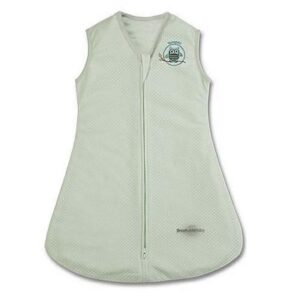
In October 2013, Breathable Baby LLC recalled around 15,000 Wearable Blankets for Infants because the products’ zipper pull tabs and sliders could detach and cause a baby to choke.
The wearable blankets came in two sizes: small (10-18 pounds) and medium (16-24 pounds) and three colors: kiwi Whoo, pink Hip, and blue Splash. There is one animal – either an owl, hippo, or elephant –stitched on the left chest of each blanket. Only BreathableSacks from Lot No. 124 with a manufacture date of 04/17/2012 are included in the recall. A tag sewn inside the recalled units where the infant’s right foot would be located states the “Date of Manufacture: 04/17/2012, Lot No. 124,” along with the washing instructions on the back of the tag.
These recalled products were sold at various stores and online retailers and breathablebaby.com nationwide from June 2012 to August 2013 for about $20. Consumers were advised to immediately stop using the BreathableSacks from Lot No. 124 and contact the manufacture to request a replacement garment.
HALO SleepSacks Wearable Blankets
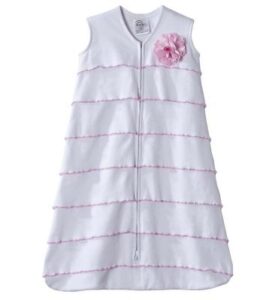
In August 2013, around 27,000 HALO SleepSacks Wearable Blankets were recalled because petals from a floral embellishment could detach, posing a choking hazard to infants. Before the recall, the manufacturer received six reports of the petals separating, including one report of an infant found gagging on a detached petal.
The affected SleepSacks Wearable Blankets were 100% white cotton with pink-edged ruffles and a pink satin rose embellishment on the front. They had cut-outs for the baby’s arms, a zipper down the center, a sewn bottom, and were available in small and medium sizes. Only SleepSacks with GPU numbers 2701, 2781, 2886, 2887, 3007, 3035, and 3142 printed on a neck label under the primary neck label are included in the recall.
These recalled products were sold at Babies R Us stores and babiesrus.com from December 2011 through July 2013 for about $25. Consumers were advised to immediately stop using the wearable blankets and contact HALO Innovations for a pre-paid envelope containing instructions to remove and return the flower and order a free replacement product.
Guidelines for Safe Infant Sleep
To reduce the risk of all sleep-related infant deaths, the AAP urges parents and caregivers to follow these guidelines:
- Remember “Back to Sleep”: Babies should sleep only on their backs until their first birthday. If your child falls asleep in a car seat, stroller, swing, infant carrier, or sling, move them to a firm sleep surface on their back as soon as possible.
- Use a Firm Sleep Surface: Use a crib, bassinet, portable crib, or play yard that meets federal safety standards with a tight-fitting, firm mattress and fitted sheet designed for that particular product. The surface should not indent when your child is placed there, and nothing else should be in the crib except for your baby.
- Only Bring a Baby into Your Bed for Feeding or Comfort: Place your baby back in their own sleep space when you are ready to go to sleep. If there is any possibility that you might fall asleep, make sure there are no pillows, sheets, blankets, or any other items that could cover your baby’s face, head, and neck or cause them to overheat. Move the baby to their own bed as soon as you wake up.
- Bed-Sharing is Not Recommended: This is especially dangerous if a child is under 4-months old, was born prematurely or with a low birth weight, or the baby’s mother smoked during pregnancy. You should also avoid bed-sharing if you or another person in the bed is a smoker, if you drank any alcohol or took any medications or drugs that could affect your ability to wake up, https://wyomentalhealth.org/xanax-alprazolam/ or if you are not the baby’s parent. Never co-sleep on a soft surface, such as a waterbed, old mattress, sofa, couch, or armchair, and never allow pillows, blankets, or other soft bedding on the bed when sharing it with your infant.
- Room-Sharing Decreases the Risk of SIDS: Keep your baby’s sleep area in the same room where you sleep for the first six months or, ideally, for the first year. Studies suggest room-sharing decreases the risk of SIDs by 50%.
- Keep Soft and Loose Objects Out of the Baby’s Sleep Area: Soft and loose objects — pillows, quilts, comforters, sheepskins, blankets, toys, bumper pads, or similar products – increase the risk of entrapment, suffocation, or strangulation when in a baby’s sleep area. Use infant sleep clothing to keep your baby warm, but avoid overheating. In general, your baby should be dressed with only one layer more than you are wearing.
- Never Let Your Child Fall Asleep on a Nursing Pillow or Pillow-Like Lounger: They may roll over, or their heads may fall in a way that can block their airway and cause suffocation. Millions of Boppy Baby Loungers were recalled earlier this year after those products were linked to eight infant suffocation deaths. The CPSC and the FDA have been warning parents and caregivers of the potential risk of suffocation and death posed by sleep positioners (wedges, mats with bolsters, nests or anti-roll type pillows).
- Offer a Pacifier at Naptime and Bedtime: A pacifier helps reduce the risk of SIDS, even if it falls out after the baby is asleep. If the pacifier does come out after your baby falls asleep, you don’t have to put it back in.
Contact an Experienced Child Injury Lawyer Today
As a nationally recognized Child Injury Lawyer, Attorney Jeffrey Killino has successfully handled a wide range of personal injury and wrongful death cases involving defective baby products and toys. If your son or daughter was harmed by an infant sleep sack, wearable blanket, weighted blanket, or swaddling blanket, Jeffrey Killino and his legal staff will commit the resources necessary to ensure your family obtains the compensation and justice you deserve. Please don’t hesitate to contact us today at 1-877-875-2927.
